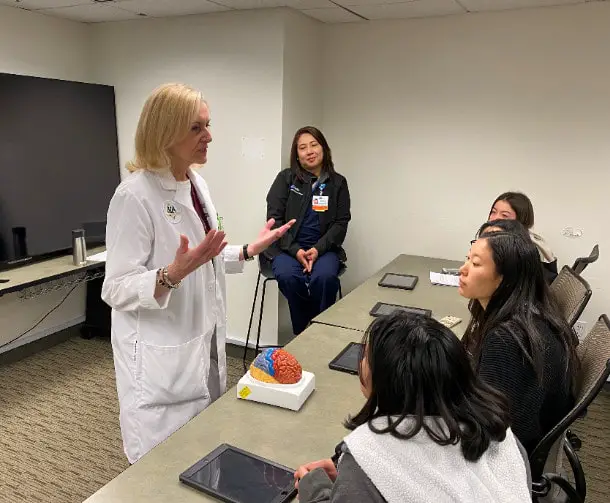Salary, Job Description, How To Become One, and Quiz
.jpg)
Clinical Nurse Specialists
Clinical Nurse Specialists direct nursing staff in the provision of patient care in a clinical practice setting, such as a hospital, hospice, clinic, or home. Ensure adherence to established clinical policies, protocols, regulations, and standards.
Table of contents
What they do
Clinical Nurse Specialists direct nursing staff in the provision of patient care in a clinical practice setting, such as a hospital, hospice, clinic, or home. Ensure adherence to established clinical policies, protocols, regulations, and standards.
- Collaborate with other health care professionals and service providers to ensure optimal patient care.
- Provide consultation to other health care providers in areas such as patient discharge, patient care, or clinical procedures.
- Develop or assist others in the development of care and treatment plans.
- Develop and maintain departmental policies, procedures, objectives, or patient care standards, based on evidence-based practice guidelines or expert opinion.
Typical day
On a daily basis, Clinical Nurse Specialists collaborate with other health care professionals and service providers to ensure optimal patient care. They provide consultation to other health care providers in areas such as patient discharge, patient care, or clinical procedures.
A typical day for a Clinical Nurse Specialist will also include:
- Develop or assist others in the development of care and treatment plans.
- Monitor or evaluate the medical conditions of patients in collaboration with other health care professionals.
- Direct or supervise nursing care staff in the provision of patient therapy.
- Present clients with information required to make informed health care and treatment decisions.
- Maintain departmental policies, procedures, objectives, or infection control standards.
Other responsibilities
Besides their typical day, Clinical Nurse Specialists also coordinate or conduct educational programs or in-service training sessions on topics such as clinical procedures. They may also chair nursing departments or committees.
On a weekly to monthly basis, Clinical Nurse Specialists read current literature, talk with colleagues, or participate in professional organizations or conferences to keep abreast of developments in nursing. They might also develop nursing service philosophies, goals, policies, priorities, or procedures.
In addition, they teach patient education programs that include information required to make informed health care and treatment decisions.
Although specific duties may vary, many of them observe, interview, and assess patients to identify care needs.
To some Clinical Nurse Specialists, it is also their responsibility to perform discharge planning for patients.
What is the job like
Job satisfaction
Is this job meaningful
74% said they were satisfied with their job and 82% said they found their job meaningful.

I was a Clinical Nurse Specialist, responsible for the clinical practice and competence of every nurse on the unit.
My work over the past 10-20 years includes the following:
- When a nurse wasn’t meeting the standards of care, I was expected to evaluate the deficiencies, re-teach when necessary, and collaborate with the unit manager as to whether a nurse should be counseled or released from her/his position.
- It was up to me to identify acceptable, adequate, and stellar practice standards among the nurses.
- I was expected to onboard new nurses who were directly out of college. Sometimes that involved going to the patient’s bedside and actually performing the procedure or standing back while the novice performed something for the first time.
- I was expected to bring new practice to the nurses and instruct them in new areas of practice, including new research.
As a CNS, my favorite element is the variability of every day! Every day is different. Typically I would arrive early and pull the unit census report, review those patients who were not there yesterday. These could be new neurosurgical patients or new admissions with neurological conditions, e.g. stroke, meningitis, encephalitis, or new brain injuries. Depending on their seriousness, I would independently round on these patients and discuss the upcoming day with the nurse.
My job was to have an awareness of every patient on the unit, all 30+ patients in various stages of healing. It was up to me to be sure the nurse was confident and competent to meet the needs of the most complicated and to assist the nurse who was unsure. Because of the behavior component to patients with illness or injury to their brains, I would check in on those who had shown problems with anger or other behavior problems to make sure everyone was coping well, including the families.
On occasion, I would arrange family conferences for those who were expected to pass away within the coming week by involving our hospice team. I would also check in with the new graduate nurses to be sure they are capable to meet the needs of their patients, which sometimes meant working with complicated equipment like lumbar drains or external ventricular devices when making a mistake could be a serious consequence to the well-being of patients. In other words, I was responsible for the competent clinical practice of all the nurses on the unit.
Pros
There are many! I’m seen by the nurses as their clinical expert on the floor. They valued my presence and depended on my opinion. I was always made to feel important and needed by these nurses. I was very involved with ensuring quality efforts for our patients. If the patient and family had a good hospital experience, I knew it was in part due to the influence I had on each, individual nurse’s professionalism, skill, and communication approach. I carried a pager day and night, not because I was tasked to do this, I chose to do it. The night shift nurses needed my presence, too. They knew I was only a phone call away. The residents, some seasoned, some green, knew they could count on my expert advice – day and night. They often expressed their gratitude to me.
Cons
Well, there were very few. I love being a CNS. There were times I would have liked more support from my administrators. It was rare for me to have difficulties, but when I did, they were not always ready with a good solution. I also noticed when awards were handed out, often the Clinical Nurse Specialists were on the awards committee and selection committees, but rarely on the receiving end. I got my “awards” from the nurses who expressed their gratitude every day.
Pros
Suitable for people who like to start and carry out projects.
Suitable for people who want to work in a supportive work environment.
This career is perfect for people who love to work indoors.
Demand for this career is growing very fast.
Cons
Not suitable for people who like to work with designs.
It is very hard to get into this career. Extensive skills, knowledge, and experience are required for this career.
Long working hours (More than 40 hours per week).
How much do they make
Average salary
Average hourly wage
Entry-level Clinical Nurse Specialists with little to no experience can expect to make anywhere between $53,410 to $61,630 per year or $26 to $30 per hour.
| Salary by experience | Annual | Hourly |
|---|---|---|
| Highest (Top 10%) | $116,230 | $56 |
| Senior (Top 25%) | $93,590 | $45 |
| Median | $75,330 | $36 |
| Junior (Bottom 25%) | $61,630 | $30 |
| No experience (Bottom 10%) | $53,410 | $26 |
This table shows the top 10 highest paying industries for Clinical Nurse Specialists based on their average annual salary.
| Salary by industry | Annual | Hourly |
|---|---|---|
| Business Support Services | $106670 | $51.28 |
| Federal Executive Branch | $96230 | $46.26 |
| Pharmaceutical and Medicine Manufacturing | $92110 | $44.29 |
| Other Investment Pools and Funds | $91990 | $44.23 |
| Office Administrative Services | $89490 | $43.02 |
| Outpatient Care Centers | $89300 | $42.93 |
| Aerospace Product and Parts Manufacturing | $89040 | $42.81 |
| Petroleum and Coal Products Manufacturing | $88660 | $42.63 |
| Other Amusement and Recreation Industries | $84800 | $40.77 |
| Wholesale Electronic Markets and Agents and Brokers | $84450 | $40.60 |
View more salary by industries here.
Where can they work
Where can Clinical Nurse Specialists work? Here is a table showing the top 10 largest employers of Clinical Nurse Specialists including the average salary in that industry.
| Employers | Total Employed | Annual Salary | Hourly Wages |
|---|---|---|---|
| General Medical and Surgical Hospitals | 1729200 | $81680 | $39.27 |
| Offices of Physicians | 192300 | $71660 | $34.45 |
| Home Health Care Services | 169630 | $75870 | $36.48 |
| Outpatient Care Centers | 150380 | $89300 | $42.93 |
| Nursing Care Facilities (Skilled Nursing Facilities) | 143250 | $72090 | $34.66 |
| Federal Executive Branch | 86860 | $96230 | $46.26 |
| Specialty Hospitals | 63910 | $82910 | $39.86 |
| Elementary and Secondary Schools | 54500 | $62170 | $29.89 |
| Employment Services | 51860 | $75300 | $36.20 |
| Psychiatric and Substance Abuse Hospitals | 39840 | $77250 | $37.14 |
What is the work day like
Working hours
Working schedule
How often do you use email in this job?
Telephone
How often do you have telephone conversations in this job?
Group discussions
How often do you have group discussions in this job?
Public speaking
How often does this job require you to do public speaking?
Level of competition
How much competitive pressure is in this job?
What is the work environment like
Office-style environment
Indoors in an environmentally controlled condition
Warehouse-style environment
Indoors in a non-controlled environmental condition such as a warehouse
Outdoors
Outdoors exposed to all weather conditions
Outdoors – Under Cover
Outdoors but under cover (e.g. structure with roof but no walls)
How to become one
Difficulty to become one
Required level of education
What level of education do you need to perform the job?
Relevant majors
Relevant work experience
How much related work experience do you need to get hired for the job?
On The Job Training
How much on the job training do you need to perform the job?
Should you become one
Best personality type for this career
People with this personality likes to start and work on projects. They also like leading people and making many decisions.
People with The Builder personality type likes practical and hands-on work. They prefer working with plants, animals, and real-world materials like wood, tools, and machinery.
People with The Thinker personality likes to work with ideas that require an extensive amount of thinking. They prefer work that requires them to solve problems mentally.
People with The Artist personality likes to work with designs and patterns. They prefer activities that require self-expression and prefer work that can be done without following a clear set of rules.
People with The Helper personality type likes to work with people and in teams. They prefer work that allows them to build relationships with others.
People with The Leader personality likes to start and work on projects. They also like leading people and making many decisions.
People with The Organizer personality type likes to follow set procedures and routines. They prefer working with data and details more than with ideas.
You can read more about these career personality types here.
People who are suitable for this job tend to like starting up and carrying out projects. They like leading people and making many decisions. Sometimes they require risk-taking and often deal with business.
They also like working with, communicating with, and teaching people. They like helping or providing service to others.
Take this quiz to see if this is the right career for you.
Work Values
Which values are the most important to a person’s satisfaction for this job?
You are someone who is results oriented. You prefer work that allows you to utilize your skills and abilities while at the same time giving you a sense of accomplishment.
You are someone who values job security, steady employment, and good working conditions. You also prefer work that keeps you busy all the time with something different to do every day.
You are someone who values job advancement and leadership roles. You prefer work that receives recognition for the work you do and jobs that are looked up to by others in the company and your community.
You are someone who likes to provide a service to others. You prefer a work environment where you can work with your co-workers in a friendly non-competitive environment.
You are someone who values a company that stands behind their employees. You prefer a work environment where everyone is treated fairly and is being supported by the company.
You are someone who likes to work on your own and make your own decisions. You prefer work that requires little supervision and are allowed to try out your own ideas.
Don’t know which career to pursue?
Take the career quiz to find careers that match your personality type.
Take The Career Quiz


.jpg)




.jpg)
.jpg)
.jpg)
.jpg)
.jpg)
.jpg)
.jpg)
.jpg)
